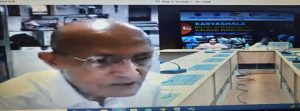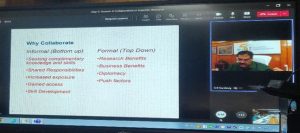 PIB Delhi – The Research Journals Division of CSIR-National Institute of Science Communication and Policy Research (NIScPR), New Delhi, is conducting one week National workshop on “Hands on Training on Scholarly Publications” during 12th-18th May 2022 sponsored by the Science & Engineering Research Board (SERB), Department of Science and Technology (DST), Govt of India, under Accelerate Vigyan Karyashala scheme. Dr KN Rao, Director, DESIDOC, New Delhi inaugurated the workshop on 12 May 2022. After inauguration, RS Jayasomu, Chief Scientist & Head, Research Journals (Biological Sciences) conducted Session I on Research Communication with two consecutive lectures: (i) Scholarly Communication: Basics of Writing Research Papers”; and (ii) “Selecting a journal to publish your Research Work” followed by hands on training on preliminary editing of research manuscripts and also identifying genuineness of journals using the UGC-CARE window.
PIB Delhi – The Research Journals Division of CSIR-National Institute of Science Communication and Policy Research (NIScPR), New Delhi, is conducting one week National workshop on “Hands on Training on Scholarly Publications” during 12th-18th May 2022 sponsored by the Science & Engineering Research Board (SERB), Department of Science and Technology (DST), Govt of India, under Accelerate Vigyan Karyashala scheme. Dr KN Rao, Director, DESIDOC, New Delhi inaugurated the workshop on 12 May 2022. After inauguration, RS Jayasomu, Chief Scientist & Head, Research Journals (Biological Sciences) conducted Session I on Research Communication with two consecutive lectures: (i) Scholarly Communication: Basics of Writing Research Papers”; and (ii) “Selecting a journal to publish your Research Work” followed by hands on training on preliminary editing of research manuscripts and also identifying genuineness of journals using the UGC-CARE window.
 The DAY-II of the Karyashala on “Hands on Training on Scholarly Publications” today (13/05/2022) started with a warm welcome by Dr NK Prasanna, Senior Scientist followed by the lecture “Ethics in Research & Publications” by BHU Distinguished Professor & SERB Distinguished Fellow Prof. SC Lakhotia, authority on the topic for Session II. He defined ‘Research’ to be primarily a search for truth, and the findings of a researcher are shared with others to enhance the general knowledge base, which helps the society to further advance its well-being. Prof. Lakhotia clarified that ethical communication is based on principles that understand one’s values, privacy, confidentiality and thoughts, effectively. Further, he added that honesty and sincerity are the fundamentals of ethical communication. Ethical communication ensures that people receive correct information in an understandable way in a timely manner, and research journals and other scholarly books serve as a platform.
The DAY-II of the Karyashala on “Hands on Training on Scholarly Publications” today (13/05/2022) started with a warm welcome by Dr NK Prasanna, Senior Scientist followed by the lecture “Ethics in Research & Publications” by BHU Distinguished Professor & SERB Distinguished Fellow Prof. SC Lakhotia, authority on the topic for Session II. He defined ‘Research’ to be primarily a search for truth, and the findings of a researcher are shared with others to enhance the general knowledge base, which helps the society to further advance its well-being. Prof. Lakhotia clarified that ethical communication is based on principles that understand one’s values, privacy, confidentiality and thoughts, effectively. Further, he added that honesty and sincerity are the fundamentals of ethical communication. Ethical communication ensures that people receive correct information in an understandable way in a timely manner, and research journals and other scholarly books serve as a platform.
In the following Session III, Dr SK Varshney, Adviser & Head, International Cooperation, DST, delivered an interesting lecture, “Collaboration in Scientific Research” emphasizing the importance of collaboration in addressing the challenges and triggered in S & T research in the modern world. He stated that it brings researchers from various disciplines across the globe to use the available resources efficiently and provides feasible solution by collective approach. Collaborative research paves way for newer science. Taking examples viz., Covid-19 and space research, Dr Varshney highlighted the socioeconomic benefits collaborative to the society across borders, cultures and disciplines. In Session IV, Prof. Sarfraz Ahmed, Director of Clinical research at Gynecologic Oncology, Department of Advent Health Cancer Institute (AHCI) Orlando, USA first spoke about developing scholarly research skills in biomedical research, and then demonstrated “Showcasing oneself as a researcher” citing his own growth from a poor rural childhood in India to an outstanding scientist of Indian origin American. In his first talk, Dr Ahmad mentioned about the specific functions of a research scholar such as maintenance of database, regular review of peer reviewed literature, hypothesization, budget management, Coordination of other departmental investigators, statistical analyses and the need for developing professional expertise in presentations. His second talk about his career growth was indeed inspiring for students and young scholars.

